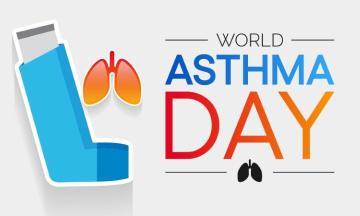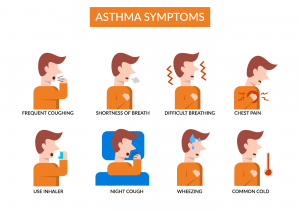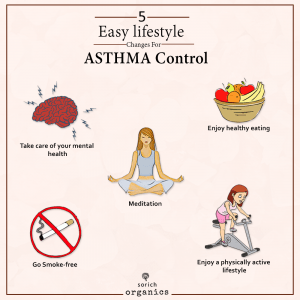World Asthma Day

Bronchial asthma, commonly known as asthma, is a chronic respiratory condition that affects millions of people worldwide. Asthma is a condition that causes inflammation and narrowing of the airways in the lungs, making it difficult to breathe. The inflammation may be triggered by allergic mechanisms in most cases but sometimes lesser-understood mechanisms can cause inflammation resulting in similar symptoms. The symptoms of asthma include wheezing, coughing, chest tightness, and shortness of breath.
Asthma can occur at any age, but it is most common in childhood. While the exact cause of asthma is unknown, certain risk factors have been identified, such as a family history of asthma, exposure to environmental irritants, and respiratory infections during childhood.
Symptoms

The symptoms of asthma can vary from person to person and can range from mild to severe. Some people with asthma may experience symptoms only occasionally, while others may have persistent symptoms that affect their daily activities. Symptoms can also worsen during certain times, such as during exercise, exposure to allergens, or when the weather changes.
Management of Asthma
One of the key features of asthma is that it is a chronic condition, meaning that it is a long-term illness that requires ongoing management. This includes taking medication to control symptoms, avoiding triggers that can worsen asthma, and monitoring symptoms to identify potential flare-ups. Those suffering from asthma will remain asymptomatic between episodes and while they are on inhalers regularly. Unfortunately, a definite cure is not available at the moment but those with controlled symptoms invariably go into sustained remission.
Treatment
Treatment for asthma usually involves a combination of medications, including inhalers that deliver bronchodilators and corticosteroids to the lungs. These medications work by opening up the airways and reducing inflammation, which can help to alleviate symptoms and prevent flare-ups. Inhaled steroids are most effective in the treatment and unlike other forms of steroids are not associated with major side effects. It is important that patients learn how inhalers are taken from their health care providers because poor technique of inhalation is cited as an important cause of uncontrolled asthma.
Lifestyle changes

In addition to medication, people with asthma may also benefit from making lifestyle changes to manage their condition. This can include avoiding triggers such as allergens or irritants, quitting smoking, and maintaining a healthy diet and exercise routine. Addressing other accompanying illnesses like gastro-oesophageal reflux disease, and sleep apnoea, obesity is also effective in controlling asthma.
Consult doctor
Several pulmonary and non-pulmonary conditions like pharyngitis, laryngitis, COPD, Tuberculosis, and heart failure can mimic symptoms of asthma. Hence it is important for individuals with symptoms to consult doctors before they buy inhalers at the pharmacy for treatment.
If you or someone you know is experiencing symptoms of asthma, it is important to seek medical attention. We, at the Department of Pulmonary & Critical Care Medicine, Ramaiah Memorial Hospital, are accomplished in the diagnosis of asthma, differentiating asthma from mimics and providing treatment options that are tailored to the specific needs of our patients. Time is spent enlightening individuals about the nature of the disease, and the importance of regular inhaler intake with proper technique. With appropriate management, most people with asthma are able to lead full and active lives without symptoms. A small fraction of patients who remain symptomatic despite inhalers are offered advanced therapy.
Awareness
World Asthma Day is observed on the first Tuesday of May every year to raise awareness about asthma and its impact on individuals and communities worldwide. The day aims to improve asthma care and prevent asthma-related deaths. At the Department of Pulmonary and Critical Care Medicine in Ramaiah Memorial Hospital, we work untiringly all year round to achieve this goal.
Consultant, Pulmonary & Critical Care Medicine

